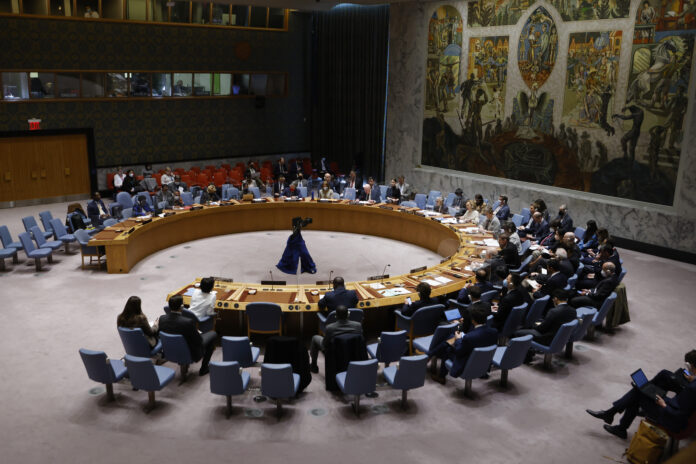Canada and allies should work to gather support among United Nations General Assembly members, including China, for a peacekeeping mission in Ukraine, says the country’s ex-ambassador.
In an interview with The West Block guest host David Akin, former Canadian ambassador to the UN, Allan Rock, said the UN Security Council has been “dysfunctional” in addressing Russia’s invasion of Ukraine.
Countries opposing Russia’s invasion should seek a recommendation from the General Assembly for a peacekeeping mission with the goal of keeping humanitarian corridors open, he said.
“In the absence of the Security Council, the General Assembly has an important role to play,” said Rock.
“If we can get China to contribute to that, it would be a wonderful coup. But have a presence on the ground that’ll make us feel, at least we’re doing something to provide protection to those who are so very vulnerable.”
Under the United Nations Charter, it is the Security Council that holds primary authority for peace and security missions, and is the body that authorizes peacekeeping missions.
However, Russia holds a veto on that council and has used it to oppose efforts to hold the country accountable for the ongoing slaughter of civilians, now entering its fourth week.
There are cases, though, where the General Assembly can do as Rock suggested.
World Court orders Russia to cease “military operations” in Ukraine
Under what’s known as the “uniting for peace” resolution of 1950, the General Assembly can act in cases where the Security Council fails to do so because of a permanent member’s negative vote.
“This would happen in the case where there appears to be a threat to the peace, breach of the peace or act of aggression,” according to the United Nations website on the rules for peacekeeping missions.
“The General Assembly can consider the matter with a view to making recommendations to Members for collective measures to maintain or restore international peace and security.”
The only time that power has been used was during the Suez Crisis in 1956, when the General Assembly invoked that resolution to create the first UN Emergency Force.
Rock added that China will be key to any such effort to bring an end to the invasion.
Trending Stories
Russia will prevail in Ukraine, Vladimir Putin proclaims to thousands at Moscow rally
Canada’s travel rules just changed. What’s new, and what’s the same?
“China, I think, is wavering,” he said. “I think that Xi Jinping is looking at the international response to this and wondering whether he wants to be associated with a pariah.”
What remains to be seen is whether such a response would risk “provoking the bear,” as Rock put it.
Russian President Vladimir Putin has threatened nuclear action if Western forces set foot inside Ukraine, and put the Russia’s nuclear forces on high alert at the start of the invasion.
That prospect of nuclear strikes, coupled with questions about Putin’s rationality, raised by leaders including Canada’s current UN ambassador, have left Western countries balking at calls from Ukraine for aid like fighter jets, and refusing to implement a NATO no-fly zone.
Rock said the question of how to do more without sparking a “reprisal” will likely dominate a meeting of NATO leaders including Prime Minister Justin Trudeau next week.
“These next couple of weeks are crucial,” he added.
“If Ukraine can survive these next two weeks with the weakening Russian force and the growing public sentiment against Russia, I think the dynamics of a negotiation could be very different.”
Ukrainians fleeing war can stay in Canada for 3 years
The devastation wrought on the Ukrainian people is staggering: cities and homes destroyed, nearly 100 children killed in Russian attacks, and last week NATO Secretary General Jens Stoltenberg raised new fears about the potential for Russians to use chemical weapons.
According to the United Nations more than 3.5 million Ukrainians have been forced to flee.
Many are in neighbouring European countries while thousands are seeking to come to Canada.
So far, Immigration Minister Sean Fraser told Akin, more than 9,250 Ukrainian refugees have already come to Canada since the start of the year, while approximately that many have applications still being processed.
It’s not clear yet how many may seek refuge in Canada, but Fraser said officials are working to keep the immigration rules flexible and able to respond quickly for Ukrainians.
“There are no certainties when it comes to war, and we need to be prepared to deal with whatever situation may arise,” he said.
“We’re going to be there to contribute to this effort, not just through the financial contributions (and) the military aid that we provided, but also by opening our doors to people who are fleeing during this time of war to provide safe haven until it’s safe to return home.”
Flexibility key to helping Ukrainian refugees in Canada: Fraser
© 2022 Global News, a division of Corus Entertainment Inc.



